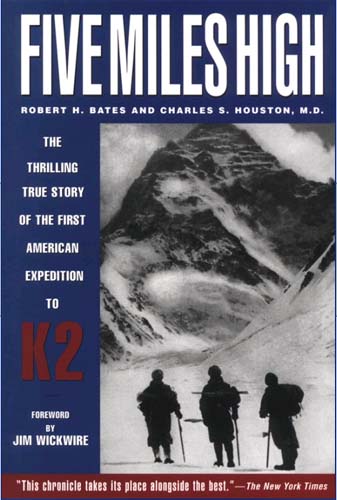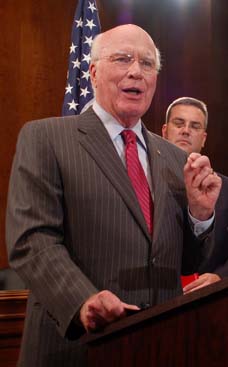
Houston lived for years in a quiet spot off Ledge Road in Burlington's South End, where he would regale a group of friends as large as it was diverse, from medical colleagues and students to King Street Youth Center teens and the keyboard player from Phish. He was a one-time director of the Peace Corps in India and of the Medical Peace Corps in Washington, D.C., before moving to Burlington in 1966 to join UVM's medical school. Sometimes called the "father of high-altitude medicine," Houston was an expert on pulmonary edema, hypoxia and the effects of altitude and the resulting diminished oxygen. His expertise stemmed from personal experience. In 1935, his first year of medical school at Columbia near his childhood home, Houston asked the dean if he could skip the last six week of classes to hike in the Himalayas. The dean obliged, and when Houston again returned the following year, he reached the summit of Nanda Devi, a 25,645-foot mountain in India. At the time, it was the highest mountain ever climbed -- a record that would stand until a 1950 ascent of Annapurna in Nepal.
Obituary for India Country Director Charles Houston
Doctor, climber Houston dies at 96
Free Press Staff Report • Wednesday, September 30, 2009
Charles Houston, the Burlington polymath who climbed K2, studied the effects of high altitude on the body and taught medicine at the University of Vermont, died Sunday. He was 96.
Charles Houston obituary
Houston lived for years in a quiet spot off Ledge Road in Burlington's South End, where he would regale a group of friends as large as it was diverse, from medical colleagues and students to King Street Youth Center teens and the keyboard player from Phish.
He was a one-time director of the Peace Corps in India and of the Medical Peace Corps in Washington, D.C., before moving to Burlington in 1966 to join UVM's medical school.
Sometimes called the "father of high-altitude medicine," Houston was an expert on pulmonary edema, hypoxia and the effects of altitude and the resulting diminished oxygen.
His expertise stemmed from personal experience. In 1935, his first year of medical school at Columbia near his childhood home, Houston asked the dean if he could skip the last six week of classes to hike in the Himalayas.
The dean obliged, and when Houston again returned the following year, he reached the summit of Nanda Devi, a 25,645-foot mountain in India. At the time, it was the highest mountain ever climbed -- a record that would stand until a 1950 ascent of Annapurna in Nepal.
His affair with climbing burned hot until the mid-1950s. Houston was part of two expeditions that attempted to summit K2, the world's second highest mountain. The 1938 trip, whose climbers reached 26,000 feet, would produce a map to the top that was used 16 years later by the first team to summit the mountain.
Houston's 1953 expedition on K2 and the team's phenomenal rescue attempt of one of the climbers is told in his book, "K2: The Savage Mountain." It would be his last climb.
Tom Hornbein, one of the first Americans to climb Mount Everest in 1963, said he met Houston in New Delhi afterward and that they developed a lasting friendship. Both were medical doctors, and they shared an interest in high-altitude research. Hornbein remembers Houston as "an incredible character" who had "the vision and willingness to try to make things happen."
Houston retired from teaching at UVM in 1979 but continued to study high-altitude physiology. He worked with a local filmmaker to digitize the historic footage of his 1938 and 1953 expeditions on K2. The film, "Brotherhood of the Rope," subsequently became the title of his biography by Bernadette McDonald.
David Kaminsky, a pulmonary specialist and an associate professor in the UVM College of Medicine, said that when he came to Burlington in 1995, he knew of Houston's world renown in high-altitude medicine and made a point of looking him up. He said Houston invited him over to lunch and later served as a consultant in one of Kaminsky's studies.
Houston's daughter, Penny Barron, said his health had declined over the past decade. Macular degeneration left him virtually blind, she said, and ironically he experienced a shortness of breath over the last few years that even specialists could not explain.
Ben Littenberg, a professor of medicine at UVM and Houston's neighbor, wrote the article on Houston in Wikipedia. His wife, Anna Marie Littenberg, said that after Houston lost his sight, she read to him for an hour a day five days a week -- "everything from Churchill's history of the English speaking peoples to the "Raj Quartet," she said.
Kaminsky recalled that Houston also had medical students come to his house to read him journal articles so that he could stay current.
Apart from his medical specialty, Houston had strong opinions on health care reform.
"He was a real thinker," Kaminsky said.
Houston, in a 1993 op-ed in the Free Press wrote, "All should pay for basic services to everyone; those who want frills can pay extra for them. We already ration health and many things today: Those who have money get more and better than those who don't -- that's what we do with schooling. That's a free society. But everyone has a right to certain basics."
He was still opining two months ago, during the national debate on health care. "Several analyses have shown beyond question that the increasing cost of health care is due in large part to the desire of doctors to make higher incomes," he wrote in a Free Press "My Turn." As an antidote, he pointed to Grand Junction, Colo., where doctors contain costs by pooling their resources "without jeopardizing one of the good reasons for going into the health care profession: the fact that it is a healing activity which has been universal for centuries and can be restored."
A memorial service for Charles Snead Houston will be held at 5:30 p.m. Thursday at the First Unitarian Universalist Society on Pearl Street.
Free Press staff writers Tim Johnson and Sally Pollak contributed to this report.













